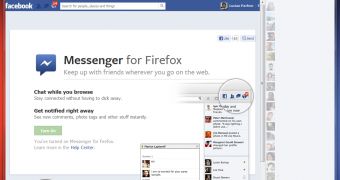Facebook Messenger for Firefox is the first of presumably many apps built on top of the Social API. The idea is to make it possible to be connected to a site or a web app without having it open in a tab all the time.
The content still comes from the web, with all the good and the bad that it brings, it's just presented in a different way.
This also means that, on the privacy front, you'll get pretty much what you would with a regular site. Which is not saying much, while most people don't really worry about their online privacy, few would actually say they trust all or even most of the sites they visit.
Mozilla puts a big emphasis on privacy though and, while the content using Social API is web content and thus no different than any web page, it feels more "local," it looks more like a native app than a web page and people will have different implicit privacy expectations.
The bad news is that Mozilla can't really do much about it. After all, if you're going to use Facebook Messenger, Facebook is going to know about it.
It will know how much you stay logged in, who you talk to the most, what links you click on and so on. In fact, since Social API apps are designed to be "always on," it's likely Facebook will get even more info on you, in terms of volume.
But just because Mozilla can't do much doesn't mean it can't do anything. The little changes and privacy features Mozilla did build into the Social API could make a big impact.
The best example is the "recommend" button which shows up in the AwesomeBar if you have a social app installed that can handle recommendations, in Facebook's case, Likes.
In fact, you'll be seeing a regular-looking Like button in the address bar, with Facebook Messenger for Firefox installed. Clicking it will be like clicking it on any page you visit.
The crucial difference is that, before you click it and unless you click it, the button doesn't do anything and it doesn't send any data to Facebook.
Normally, Facebook's Like buttons scattered all over the web "ping" back to Facebook whenever you visit a page that has them as long as you are logged in. Even if you don't click on the Like button, Facebook will know you visited the page.
But with the button built into Firefox, that won't happen. It's not just Facebook that does this, Google's +1 button and most other similar tools also track users even if they don't interact with the buttons.

 14 DAY TRIAL //
14 DAY TRIAL //